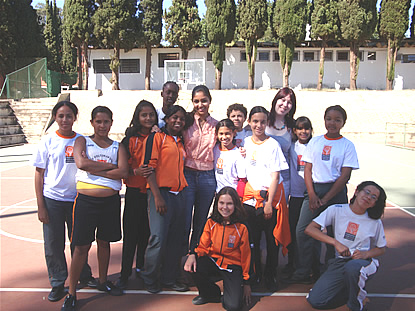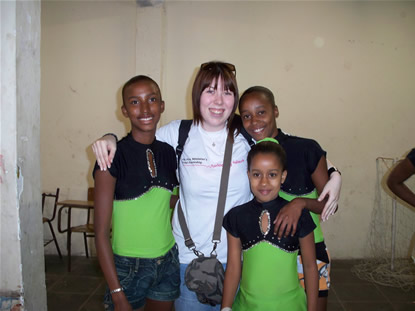Emily Murrell
18 years old; this year she goes to university
Farnham - Surrey, UK
With the objective to know a new culture and to learn how to compete in the international scene, the program Prime Minister's Global Fellowship (PMGF), organized for the British Council, brought to Brazil a group of 21 young of 18 the 19 years from the United kingdom, that had detached in theirs studies and have enterprising profile. They stayed in Brazil for six weeks from 20 july to 30 august.

It never occurred to me before taking part in the 6-week Prime Minister's Global Fellowship Programme in Brazil this summer, that I could feel comfortable anywhere else in the world other than the Hampshire village where I have lived my entire life.
From my first day in Rio de Janeiro, I was immediately overwhelmed by the welcoming nature of Brazilian people; many of whom treated me like family. I was fortunate to spend the first two weeks learning Portuguese at Cultura Inglesa and experiencing the culture first hand, from local markets to samba dance lessons. The language lessons were sufficient to help me get by, but I was surprised that the majority of my communication with local people was through hand gestures and facial expressions. It proved to me that it is true that speaking is just one small aspect of communication.
I was pleased to learn that, like me, the Brazilian people love their food, although it is fair to say I have eaten enough beans and rice to last me a lifetime! I enjoyed presentations at the British Council regarding a wide array of issues, from topics as diverse as climate change, sport and social responsibility. I will never forget the spectacular views from Corcovado, standing beneath the statue of Christ overlooking Rio.
Visiting many schools throughout the 6-week programme enabled me to compare the education system, not solely between the UK and Brazil, but also public versus private education within the country. I was fortunate to spend 2 weeks working as an English teaching assistant in a school named Colegio 7 Septembro in Fortaleza where, like in all the schools I visited, it was evident that children had a great appreciation for their education.

School is a luxury in Brazil not an expectation. For many children it is a chance to escape hardship at home and gain skills necessary for future employment. I admired the close relationship and mutual respect between students and teachers, something often non-existent in British schools. Although I found it strange at first witnessing pupils hug their teachers at the end of each lesson, I soon came to realize that pupils felt the need to constantly thank them and there was a major element of trust and respect between them. On the whole however, the standards of behavior were far lower than that of UK schools and class sizes reached up to fifty, considerably higher than they should be. I found it amusing to be repeatedly asked by the school children if I had met the Queen, whether I drunk tea and if the weather was hot in England. Sadly, my answer to all three questions was ‘no’!

Emily and the kids.
Undoubtedly some of my most memorable and thought-provoking experiences were my visits to 3 favelas (slums), two of which were in Rio de Janeiro and the third was in Sao Paulo. I made the naive assumption that after my first encounter with poverty I would no longer be shocked by future visits, but I could not have been more wrong. On each occasion I noticed different aspects of life in a favela, reluctant to accept, even now, that this is the reality of life for many thousands of people. Initially I noticed the poor quality buildings, the dangerous electric cables linking homes and the numerous stray dogs roaming the narrow pathways. Secondly, I observed the open sewage systems, the strong smell of waste in every part of the community and the lack of privacy and space for families. Finally, and by far the hardest aspect to witness was the people. A child pushing himself along a filthy floor on a piece of broken wood for entertainment, the sight of people peering through what was often their only window, constantly seeming to look out for potential danger or appearing tired of life. What is particularly cruel about the modern world as it develops and prospers is the sad reality that every day these poor people have to overlook a sea of wealth from where they live.
Perhaps more than anything, my experience in Brazil has reminded me, as we all need reminding of sometimes, to appreciate everything I have and the opportunities I have been given. Witnessing such abject poverty first-hand has also made me vow to do what I can in the future to help improve the situation. I have certainly experienced a fantastic and thought-provoking 6 weeks and have made some friends for life who I hope to visit again soon.
clique aqui e leia o texto traduzido >>>
Send this page to a friend
|